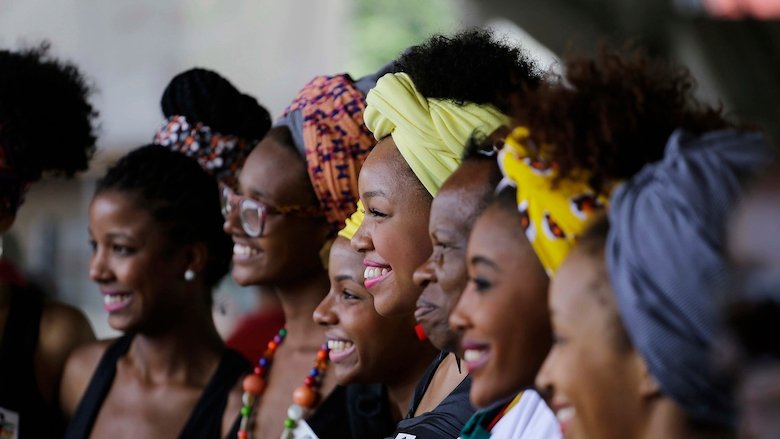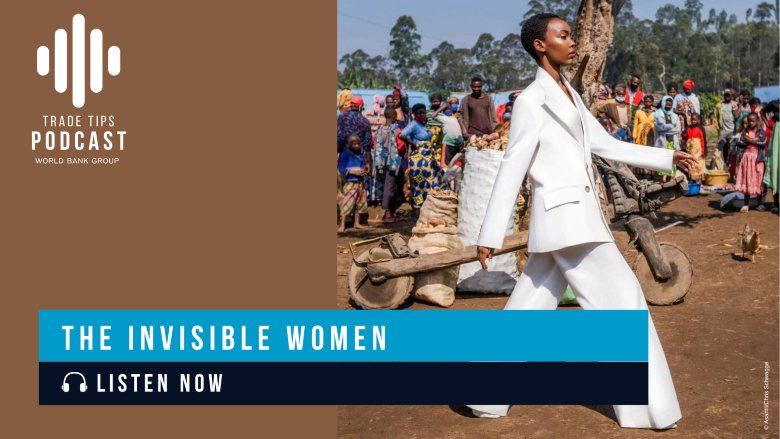WASHINGTON, DC, March 8, 2023 – Participation in trade can be transformational when it comes to economic opportunities for women.
"Trade can improve economic outcomes for women, increasing employment and wages, leading to better jobs, and lowering costs for women. It can help gender equality more broadly.”
But there is still a large gulf between women and men when it comes to doing business across borders, as Heidi Stensland, Senior Private Sector Development Specialist at the World Bank Group explains.
"Trade is a critical driver of poverty reduction, but it’s hard to win a game if you’re playing with half the payers, or fewer players than the other team.”
Heidi says women still make up a minority of business owners who trade across borders, often facing a tricky mix of hurdles, both structural, and sometimes cultural. Barriers for women are varied and include a lack of access to official information, participation in trade associations, less representation, and that fewer women are consulted by governments on border processes. "If women don’t have a say, their needs cannot be addressed,” she adds.
So what’s being done about it?
One Rwandan based company, Asantii, a pan-African fashion brand exporting across the globe, has placed women at the heart of its business model. Its name is a play on words, similar to the Swahili word for thank you. “It’s a thank you to the continent” Maryse Mbonyumutwa, Asantii founder explains.
She has worked in the clothing manufacturing and supply chain industry for over two decades. “In our industry the role of women is huge.”
She adds: “When you work in the garment manufacturing trade and you travel to places like Vietnam, Bangladesh and Cambodia, you really understand the job creation potential of this industry especially for young women - being in an industry that can create so many jobs…. It was a pity that with unemployment so high on the continent I had never come across a pan -African fashion brand."
At her Kigali factory, 89% of the 5,000 workers at the factory are women. She has set up a free lunch, a free nursery and offers free sanitary products for her workers.
Maryse, who cites tariff and non-tariff barriers as reasons why businesses like hers are unusual, is adamant that trade should be part of creating better jobs and opportunities for women.
"For a Rwandan worker, a Rwandan women, what policies can we have that make sure the benefits are equally shared?" she asks.
But the experience of Maryse, in Rwanda, putting women at the heart of her business, is still unusual.

Trade policies and practices that are gender inclusive matter for women.
Shutterstock
Trade can improve economic outcomes for women, increasing employment and wages, leading to better jobs, and lowering costs for women. It can help gender equality more broadly.
Diana Yates, is a cocoa exporter and processor amongst other businesses in tourism. She owns Cathliro Trading in the Solomon Islands.
She explains that while she’d like to trade more, she doesn’t always feel included in essential conversations about how.
“There are instances - being a female - where you don’t feel you’re being notified about upcoming events and developments.”
Diana adds: “My main aim is to create job opportunities for those living in rural areas. There are so many resources in the Solomon Islands, and we need to convert and value add the resources and find the markets.”
Heidi Stensland says that sitting back is not an option when it comes to these issues.
She cites a World Bank Group initiative working with various stakeholders in Africa’s Great Lakes Region, where simplified clearance procedures for low value transactions made it much easier for women to trade.
Practical initiatives like pedestrian lanes, and lighting, combined with better access to information, and training for officials have transformed the experience of female traders.
Heidi adds: “One of the quick wins was the introduction of solar powered lighting.” This led to extended opening hours, allowing women to trade and be able to organize their home lives. Heidi says there’s also been a significant reduction in harassment of women at the Goma border between Rwanda and the Democratic Republic of Congo.
It’s clear there’s some way to go when it comes to equal opportunities for global trade. The issues are complex. But that there’s a drive from businesses like Asantii, from women like Diana Yates, from governments and others, to address the issues which have led to an un-level playing field when it comes to trade.
As Diana Yates in the Solomon Islands says: “If we sit back and we don’t explore (opportunities) we will be at a disadvantage.”
___
Support for the initiative was provided by the World Bank Group with funding from the Trade Facilitation Support Program (TFSP). The TFSP is funded by nine donor partners: Australia, Canada, the European Commission, the Netherlands, Norway, Sweden, Switzerland, the United States, and the United Kingdom. The program provides assistance to countries seeking to align their trade practices with the World Trade Organization Trade Facilitation Agreement (WTO TFA).

Trade Tips Podcast
Cover art photography: Asantii, Cedric Mizero (Art direction), Chris Schwagga (Photographer)
To learn more, listen to Trade Tips – the World Bank Group’s new podcast that tackles the big issues in the world of trade and explores solutions. This episode, Invisible Women, explores why women are so invisible when it comes to trade, and why policies and practices that are gender inclusive matter.

